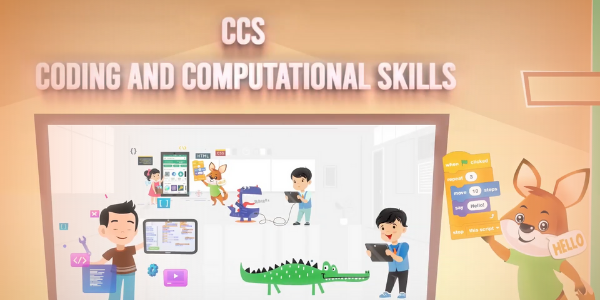How is LEAD’s CCS programme making a difference by being NEP 2020 Compliant?

Subscribe to our newsletter
We aren’t born with computational thinking and algorithmic intelligence. Luckily, these two skills can be ingrained and built into our consciousness with practice. To support us in this endeavour, the mighty crutches of technology are by our side. While our dream of witnessing flying cars and a time machine is still far-fetched, using technology to create these widgets isn’t impossible.
The National Education Policy (NEP) 2020 too, lays emphasis on teaching technology, especially computers, to students from early on. This mandate demands an excellent coding curriculum and modern machinery combined with upskilled teachers. Here’s where LEAD’s Coding and Computational Skills (CCS) programme flies to your school’s rescue. In an exclusive interview, Anirudh Garg, the Senior Manager of the Strategy team at LEAD, reveals how this course can benefit schools across India.
What inspired LEAD to introduce a CCS programme exclusively for schools?
While computer education has become mainstream for over 10 years, most schools have failed to implement it effectively. Through our research, we found that, firstly, schools only held computer classes for Grades 9 onwards. Secondly, the teachers would run the classes theoretically without giving much practical experience to students.
Furthermore, the curriculum taught is outdated and has not been updated to match the new age requirements. This is happening in a time when countries internationally have mandated computer education for children from as early as Grade 1 and have defined rigorous curriculum matching the current market standards.
This gap inspired us to curate the affordable CCS programme which schools can provide to students and make them future-ready. We believe that it will also reduce the burden on parents as they now don’t have to find a solution in the form of an after-school programme.
How does this help schools become more NEP 2020 compliant?
The CCS programme was conceptualised before the NEP 2020 revelation. But, it still validates many primary value drivers that we had aimed to deliver through CCS. The policy primarily indicated a need for teaching computers as a skill rather than just computer application knowledge.
Additionally, NEP 2020 prioritised incorporating this subject early on. Hence, by adopting CCS, schools fulfil these requirements of ingraining computers expertise, a craft, from Grade 1.
Are all schools ready to incorporate coding? How is LEAD training teachers and helping schools prepare for this?
The schools are keen and excited to start with coding. However, the computer hardware infrastructure available is old. The new-age programming languages need fast computers powered by high-speed internet. This requires schools to update their machinery.
Another manageable gap is teachers’ skill. Most computer teachers are either unfamiliar with coding or are familiar with older programming languages. They haven’t brushed up their skills in a long time. For this, we planned a short teacher training programme where we have video lectures by experts to help teachers with the 5 coding platforms that they’d be using in the classroom. It’s a one-month programme that we provide to all the computer teachers at the beginning of the class.
What has been the initial response from schools? Are they ready to introduce this programme?
The schools have been ecstatic to run this programme. We have more than 1000 schools that bought it in the first year of launch. We have already started the training programme with more than 550 teachers from 400 schools across the country despite the Covid-19 second-wave lockdowns. Schools are hiring new computer teachers and are continuously in touch with us on how they can do better.
What can children expect to learn from such a programme? How can they apply what they learn?
The learning from the CCS programme is endless. In terms of breadth, it covers basic block-based programming to coding in Python (a software language favoured by data scientists) and Android app development. In terms of depth, all the classes learn programming through a project-based learning method. The projects fall into three broad themes and increase in difficulty and complexity with an increase in grades.
The themes include (i) Me and my other subject curriculum, (ii) Me and my neighbouring environment, and (iii) Me and the whole world. That means that projects range from coding a visual proof of the Pythagoras theorem to coding a heat intensity map of the world. The programme is teaching a way of thinking that promotes using computers to solve complex problems (also called Computational Thinking). This encourages students to carry their learning from this programme forward to all subjects and then beyond to solving problems in other fields of their life.
What is the need for such a programme now?
To become a global powerhouse for IT services and create more jobs in the sector, we need to have the talent which is as capable, if not more, as the rest of the world. The only way to build and foster such talent is to keep the students up-to-date with what’s happening in the technological field. We can build their interest by using interesting examples making them want to grow in the field. That’s the kind of programme that we have attempted to create.
LEAD is transforming schools by making children future-ready. To make yours a LEAD Powered School: Partner with us today
.png)
.png)
.png)
.png)
